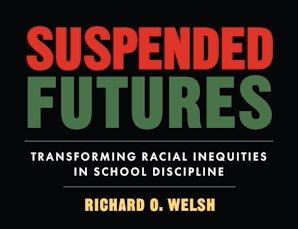By Jenna Somers

Two recent studies indicate that school-level factors play a considerable role in racial disparities in school discipline. The first study, conducted primarily through a series of interviews, reveals disciplinary tensions between district leaders, school administrators, and teachers regarding disciplinary philosophy as well as discretion and accountability in the disciplinary referral process. The second study, a policy brief, demonstrates through empirical findings the implications of educators’ subjective discretions in the disciplinary process, finding that Black students are more likely to be persistently referred and suspended than other students.
“How student behavior is perceived and addressed is one of the biggest challenges afflicting public schools. A more granular understanding of the disciplinary process in schools is key to informing more effective interventions to disrupt discipline disparities. These studies highlight some of the nuances in the sequence from being referred to the office to being suspended in schools,” said Richard Welsh, author of the studies and associate professor of education and public policy at Vanderbilt Peabody College of education and human development. Welsh recently published a similar study on the role of school-level factors in reducing exclusionary discipline.
“Navigating tensions in school discipline: examining school leaders, teachers, and the conversion of referrals into suspensions”
Published in the American Journal of Education, Welsh conducted this qualitative study in an urban emergent district in the Southeastern United States. His interviews with school administrators and teachers demonstrate varying disciplinary philosophies that create tensions in the relationships and interactions of school personnel as well as in the processes for handling perceived misbehavior. Principals, assistant principals, and teachers may disagree on the contributing factors of racial inequality in school discipline, how discipline should occur (punitive vs. nonpunitive), and who is most responsible for behavioral management, among other diverging opinions.
These philosophical tensions often lead to tensions associated with teacher discretion and accountability in the disciplinary process. Office disciplinary referrals are usually generated by a teacher and subsequent suspensions are decided by a school administrator; however, this study shows that teachers have considerable power over the decision to suspend a student because administrators do not want to appear unsupportive of a teacher’s disciplinary decision by not issuing a suspension following a referral.
Furthermore, race, gender, and power dynamics among school personnel also influence relationships and interactions that affect the disciplinary process. For example, racial congruence among administrators and teachers may support greater collegiality and cooperation throughout the process, but school leaders and teachers’ implicit beliefs about the context and causes of student behavior contribute to racial inequality in school discipline.
In discussing the implications of this study, Welsh suggests that to reduce racial inequality in the disciplinary process, teachers may need more structure as well as mentoring and coaching on classroom management and cultural responsivity. This support would improve their discretion in navigating the referral process and help administrators manage teacher accountability. Likewise, districts may need to focus on developing and expanding the professional capacity of school leaders.
“The plight of persistently disciplined students: examining frequent flyers and the conversion of office discipline referrals into suspensions”
Welsh’s policy brief, written in collaboration with Luis A. Rodriguez at New York University and published in Educational Evaluation and Policy Analysis, reinforces findings from Welsh’s interviews with administrators and teachers. The brief uses quantitative data from New York City schools to demonstrate how educators’ subjective discretions to submit office disciplinary referrals fuel racial disparities in the disciplinary process.
In New York City, Black students are persistently referred (meaning referred to the office more than two times in the same school year) and persistently suspended at rates that are nearly twice as high as their share of the student population. They are also persistently referred at nearly twice the rate of other student groups. In particular, Black male students disproportionately receive exclusionary discipline; they account for 14 percent of the New York City school population, but they comprise 29 percent of the persistently referred students and 35 percent of the persistently suspended students.
Interestingly, administrators convert referrals to suspensions for all persistently disciplined students at a lower rate (0.66) than for students receiving a single suspension (0.75) in a school year. These data may reflect tensions between the teachers who persistently refer students and the administrators who decide not to suspend them as frequently. That said, the conversion rate of referrals to suspensions for Black students is higher than for other student groups, with Black students receiving a suspension for every 3.2 referrals and other students receiving a suspension for every 3.7 to 4.8 referrals.
Taken together, these findings may “provide justification for concerns that anti-Black racism prevalent in American society is replicated in schools through exclusionary discipline practices,” write Welsh and Rodriguez. To address these concerns, the authors also suggest that improvements to school characteristics, including fostering a positive school climate and hiring and retaining diverse, experienced teachers, may help to reduce racial disparities in school discipline.
The latest findings and new directions of Professor Welsh’s research can be found at the School Discipline Lab. Register for updates.

